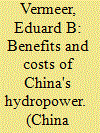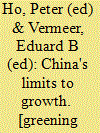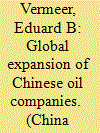|
|
|
Sort Order |
|
|
|
Items / Page
|
|
|
|
|
|
|
| Srl | Item |
| 1 |
ID:
104091


|
|
|
|
|
| Publication |
2011.
|
| Summary/Abstract |
During the past few years, the Chinese government has formulated ambitious plans for building many large hydropower stations, but so far it has withheld final approval for the construction of the majority. The environmental problems and rising cost of coal-fired stations, China's Copenhagen commitment, the creation of a high-voltage national power grid, and the availability of cheap capital should have all worked to the advantage of hydropower. Moreover, present projects require much less resettlement than those in previous decades. However, since 2006 political concern for the social problems of forced migration and distrust of the business alliance between power companies and provincial governments seem to be obstacles. Stricter regulations for environmental impact assessment, more comprehensive planning of water and reservoir use, and a lack of staff have lengthened approval processes. Central and provincial governments do not agree on developmental priorities and electricity prices. Uncertainty about obligations imposed on investing power companies is a factor too. Thus, hydropower policy suffers from conflicting goals and uneven commitment of various bureaucratic interests. Even if a clear policy commitment could improve policy implementation, China's target of 330 GW of regular hydropower capacity in 2020, and thereby its renewable energy target, are unlikely to be met.
|
|
|
|
|
|
|
|
|
|
|
|
|
|
|
|
| 2 |
ID:
046313


|
|
|
|
|
| Publication |
Surrey, Curzon Press, 2002.
|
| Description |
xvi, 171p.
|
| Standard Number |
0700714235
|
|
|
|
|
|
|
|
|
|
|
|
Copies: C:1/I:0,R:0,Q:0
Circulation
| Accession# | Call# | Current Location | Status | Policy | Location |
| 046278 | 340.50951/VER 046278 | Main | On Shelf | General | |
|
|
|
|
| 3 |
ID:
074292


|
|
|
|
|
| Publication |
Oxford, Blackwell Publishing, 2006.
|
| Description |
viii, 275p.
|
| Standard Number |
1405153903
|
|
|
|
|
|
|
|
|
|
|
|
Copies: C:1/I:0,R:0,Q:0
Circulation
| Accession# | Call# | Current Location | Status | Policy | Location |
| 051799 | 363.70951/HO 051799 | Main | On Shelf | General | |
|
|
|
|
| 4 |
ID:
137095


|
|
|
|
|
| Summary/Abstract |
PetroChina, Sinopec, and China National Offshore Oil Corporation (CNOOC) have been prominent instruments used by the Chinese government in its policies to ensure greater security of oil and gas supply in the face of growing domestic shortages. Chinese overseas acquisitions and activities have diversified, with a greater emphasis on offshore, gas and the Americas. Both parent and listed daughter companies are run by CCP-appointed managers who have to balance political and commercial goals. Their lacklustre financial performance can be attributed to domestic and institutional constraints, such as state-set social goals, low pricing, and government controls over their monopolies. Not only have state companies sustained losses from refining activities, but financing their rapid expansion has also increased their debts and dependency on the government. Cases of corruption have further weakened their political influence. Long-term supply contracts have made a greater contribution to the security of energy supply as compared with equity oil and gas. Nationalistic preferences for investment over trade increase company risks but are somewhat mitigated by an integral economic package approach and political backing in weak countries. Recent policies to reduce monopoly power are unlikely to produce viable commercial alternatives, but may increase the focus on listed daughter companies, overseas assets and international trading. Because of these developments and the recent fall in oil prices, a better evaluation of political and economic risks is required.
|
|
|
|
|
|
|
|
|
|
|
|
|
|
|
|
| 5 |
ID:
137540


|
|
|
|
|
| Summary/Abstract |
PetroChina, Sinopec, and China National Offshore Oil Corporation (CNOOC) have been prominent instruments used by the Chinese government in its policies to ensure greater security of oil and gas supply in the face of growing domestic shortages. Chinese overseas acquisitions and activities have diversified, with a greater emphasis on offshore, gas and the Americas. Both parent and listed daughter companies are run by CCP-appointed managers who have to balance political and commercial goals. Their lacklustre financial performance can be attributed to domestic and institutional constraints, such as state-set social goals, low pricing, and government controls over their monopolies. Not only have state companies sustained losses from refining activities, but financing their rapid expansion has also increased their debts and dependency on the government. Cases of corruption have further weakened their political influence. Long-term supply contracts have made a greater contribution to the security of energy supply as compared with equity oil and gas. Nationalistic preferences for investment over trade increase company risks but are somewhat mitigated by an integral economic package approach and political backing in weak countries. Recent policies to reduce monopoly power are unlikely to produce viable commercial alternatives, but may increase the focus on listed daughter companies, overseas assets and international trading. Because of these developments and the recent fall in oil prices, a better evaluation of political and economic risks is required.
|
|
|
|
|
|
|
|
|
|
|
|
|
|
|
|
|
|
|
|
|